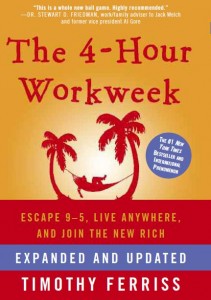I just finished reading The 4-Hour Workweek by Tim Ferriss after I saw Michael Hyatt recommend it on Twitter. I enjoyed the book and it was a pretty quick read. As a Christian school administrator, I will never be able to implement a lot of the goals of this book. However, this book did give me a chance to reevaluate my systems and make sure I am being as efficient as possible while maintaining a high level of customer service.
Here are the notes I highlighted in this book:
- Sports evolve when sacred cows are killed, when basic assumptions are tested. The same is true in life and in lifestyles.
- Focus on being productive instead of busy.
- It is far more lucrative and fun to leverage your strengths instead of attempting to fix all the chinks in your armor. The choice is between multiplication of results using strengths or incremental improvement fixing weaknesses that will, at best, become mediocre. Focus on better use of your best weapons instead of constant repair.
- To enjoy life, you don’t need fancy nonsense, but you do need to control your time and realize that most things just aren’t as serious as you make them out to be.
- Having an unusually large goal is an adrenaline infusion that provides the endurance to overcome the inevitable trials and tribulations that go along with any goal. Realistic goals, goals restricted to the average ambition level, are uninspiring and will only fuel you through the first or second problem, at which point you throw in the towel.
- If the potential payoff is mediocre or average, so is your effort.
- The fishing is best where the fewest go, and the collective insecurity of the world makes it easy for people to hit home runs while everyone else is aiming for base hits. There is just less competition for bigger goals.
- I believe that success can be measured in the number of uncomfortable conversations you’re willing to have.
- Doing something unimportant well does not make it important. Requiring a lot of time does not make a task important.
- It’s easy to get caught in a flood of minutiae, and the key to not feeling rushed is remembering that lack of time is actually lack of priorities.
- If you haven’t identified the mission-critical tasks and set aggressive start and end times for their completion, the unimportant becomes the important. Even if you know what’s critical, without deadlines that create focus, the minor tasks forced upon you (or invented, in the case of the entrepreneur) will swell to consume time until another bit of minutiae jumps in to replace it, leaving you at the end of the day with nothing accomplished.
- Am I being productive or just active?
- If you prioritize properly, there is no need to multitask. It is a symptom of “task creep”—doing more to feel productive while actually accomplishing less.
- The e-mail medium forces people to define the desired outcome of a meeting or call. Nine times out of ten, a meeting is unnecessary and you can answer the questions, once defined, via e-mail.
- It is your job to prevent yourself and others from letting the unnecessary and unimportant prevent the start-to-finish completion of the important.
- There are two types of mistakes: mistakes of ambition and mistakes of sloth.
- True freedom is much more than having enough income and time to do what you want.
- Sharpening your logical and practical mental toolbox is not being an atheist or unspiritual. It’s not being crass and it’s not being superficial. It’s being smart and putting your effort where it can make the biggest difference for yourself and others.
- Gain a language and you gain a second lens through which to question and understand the world.
- What’s been on your to-do list the longest? Start it first thing in the morning and don’t allow interruptions or lunch until you finish.
- Measure compulsively, for as Peter Drucker stated, What gets measured gets managed.
- Being busy is not the same as being productive.
Categories:

